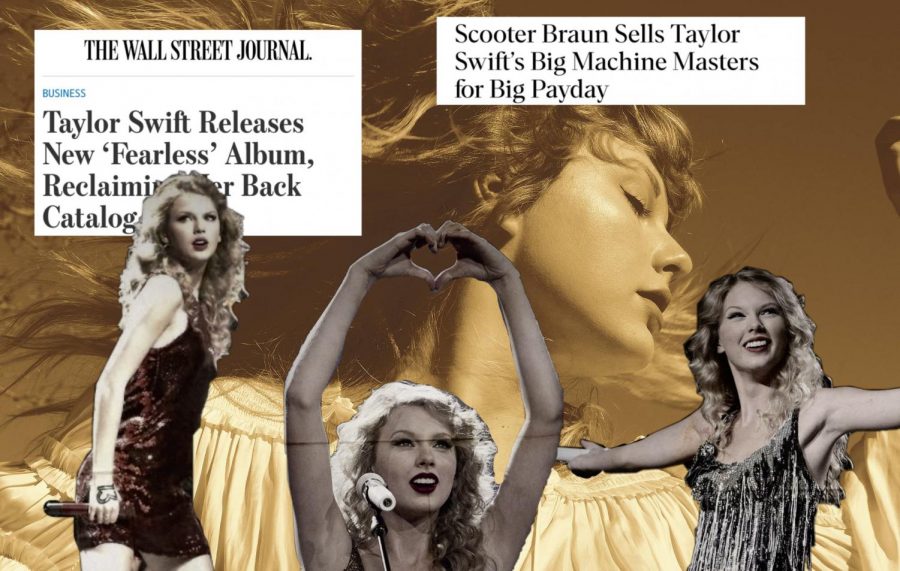Taylor Swift’s ‘Fearless’ move to reclaim her music
“I don’t know how it gets better than this,” Taylor Swift sang during the opening track to her newly released and re-recorded album Fearless (Taylor’s Version). The already chart-topping album that released just last Friday on April 9th has accumulated raving reviews from fellow artists, the press, and, of course, her longtime superfans.
Fearless was originally released in 2008 when Swift was just an 18-year-old up-and-coming country music artist from Nashville, Tennessee. The album, which went platinum and was awarded Album of the Year at the 2010 Grammys, was Swift’s first real breakthrough into the music industry as a young artist. Since then, she has continued to release albums that break records and sweep up awards, most recently with her quarantine album Folklore. Fearless (Taylor’s Version) is only the first of six albums she plans to re-record and release, the others being each album she has released up to her 2019 pop album Lover.
At first glance, many believe that Swift’s decision to re-record her first hit album comes from a desire to make more money or aggravate her record company, which many artists have done in the past. But this assumption has been proven wrong as feuding between Swift and record executive Scooter Braun began publicly airing out starting in 2018 around the time Swift announced her plan for this ambitious project. The timeline has been anything but easy to follow, so let’s break it down.
American independent record label, Big Machine Records, previously owned all of Swift’s master recordings to her first six albums. The company later sold all of the masters to Scooter Braun which gave him full ownership of all rights concerning Swift’s music. Braun refused to sell Swift’s master recordings back to her and instead chose to sell them to a third party on the condition that that third party does not sell the masters back to Swift. If the third party was ever going to sell Swift’s masters back to her, she would need to sign an ironclad non-disclosure agreement stating that she could “never say another word about Scooter Braun unless it was positive.”
In a tweet from November 16th, 2020, Swift further explained this and the sale of her masters in hopes of clearing things up for those understandably confused. She stated that she “would have to sign a document that would silence [her] forever before [she] could even have a chance to bid on [her] own work.” She added that her legal team had never seen an NDA like the one Scooter Braun had presented to her and they compared it to the NDAs often used to silence assault victims.
With Scooter Braun still being able to profit off of Swift’s old music for many years to come, Swift decided to reclaim her catalog by re-recording her stolen music and producing them under the added title “Taylor’s Version.” While this project proves to be an enormous undertaking, Swift has described the process of re-recording her music to be “both exciting and creatively fulfilling.”
With the newly recorded version of her hit song “Love Story” being released on February 12th, 2021, fans have been eagerly awaiting the release of the entire deluxe version of Fearless (Taylor’s Version). For many Swift fans, Fearless is an album that explores what it feels like to be a teenager in high school struggling with self-identity, friendships, and heartbreak. Songs like “Fifteen” and “You Belong With Me” have continuously shown to become favorites among young fans who find that Swift’s lyrics accurately and beautifully depict the feelings that at times feel hard to put into words. And that is something Swift has always mastered, putting difficult feelings and emotions into lyrics that can resonate with almost anyone who sits and listens.
It is evident in listening to her re-recording of Fearless that Swift worked hard to mimic the teenage angst and style that her 18-year-old voice embodies in the original album. But being 31 years old now, and feeling resolved in terms of her high school heartbreak, it’s no shock that her voice has since grown immensely. While fans no longer hear Swift become out of breath trying to explain her love to a high school crush during the bridge of “You Belong With Me” or the slight cracking of her voice during the chorus of “The Way I Loved You,” the album remains very similar to its original style from the way the background instrumentals play, all the way down to the recreated light-hearted laugh in “Hey Stephen.”
Swift has additionally given her fans brand new songs from what she calls “the vault.” These songs were written during the original recording of Fearless but ultimately never quite made the cut to have a spot on the album. Swift has given her fans six new songs on Fearless (Taylor’s Version) and even collaborated with country artists Maren Morris on “You All Over Me” and Keith Urban on “That’s When.”
Swift’s decision to reclaim her music has proven itself to be a powerful and inspiring project for not only her but for all of her fans involved. After everything that has happened, lyrics like “I lived, and I learned,” seem to take on a different, deeper meaning. The nostalgia of, once again, being able to relive Swift’s 2008 Fearless era has touched fans everywhere and it is only the first of six she has in store for them.


